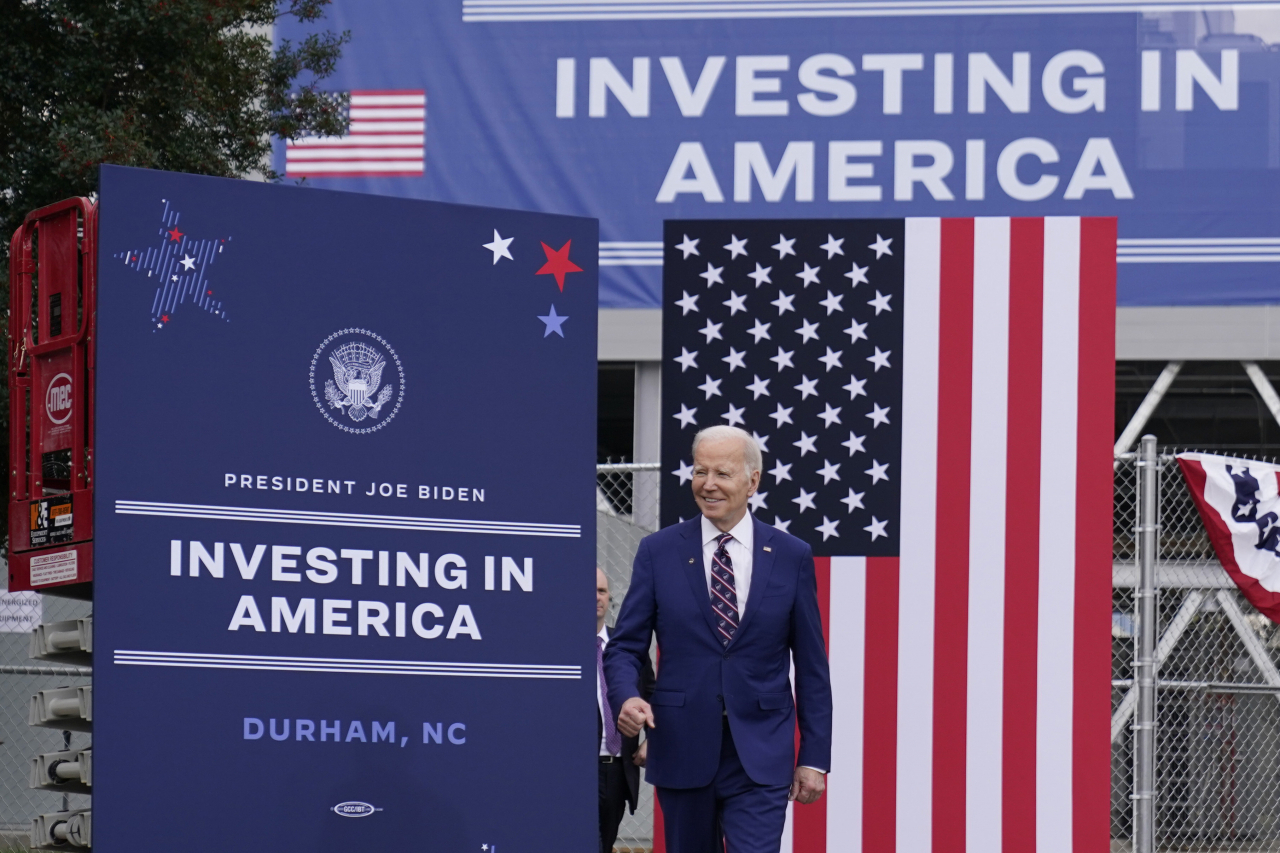 |
US President Joe Biden arrives to speak about jobs during a visit to semiconductor manufacturer Wolfspeed Inc., in Durham, NC on March 28. (AP-Yonhap) |
South Korean chipmakers are facing increasing pressure amid an intensifying US-China rivalry, as Washington has reportedly requested the Korean government to hold back from filling China's shortfalls in chips.
Seoul’s presidential office refused to comment Monday over a report from the Financial Times that the White House had asked the Korean government to urge its chipmakers to "not fill any market gap" in China, if Beijing bans US-based Micron Technology from selling chips.
Both Samsung Electronics and SK hynix said they had not received such a request from the government.
The Financial Times cited four people familiar with the matter to report that the US government made the request as South Korean President Yoon Suk Yeol prepared to travel to Washington for a state visit on Monday.
While it is too early to conclude the exact meaning of the US' request, some industry watchers here believe the US may be seeking to put direct pressure on China's consumer appliances market.
At the same time, the US is making clear its intent to involve the world's two largest memory chipmakers, Samsung Electronics and SK hynix, in its chip battle with China.
“China does not have a memory chip supplier as competitive as Samsung or SK hynix, and seeing how the White House mentioned the two memory chipmakers, Washington may be trying to press China’s consumer appliances market by limiting the chip supply,” an industry official said under the condition of anonymity.
In the case of NAND flash chips, China’s YMTC may be able to compensate for a small portion of the total demand. In the case of DRAM, the Chinese market would suffer a severe shortage if Micron is suspended, the official added.
Korean chipmakers, which produce in China and gain meaningful sales from the market, would also feel great pressure if the US government officially makes such a request to not expand their production volume.
The US and China are Samsung's biggest markets for chip products, and while the exact figures are not public, the two countries account for similar portions of its total sales.
SK hynix also has the two countries as its top two clients, with the US accounting for 50 percent of its total sales and China about 30 percent.
While all are only assumptions for now, some also view that the US move as designed to secure leverage against Korean chipmakers in future negotiations drawing near on the export of chips and equipment to Beijing.
The US imposed export controls to cut China from certain semiconductors made with US equipment in October last year, and it granted the South Korean companies, which operate chip manufacturing facilities in China, a one-year exemption.
Earlier this month, China launched a national security probe into Micron, the world's third-biggest memory chip maker, which generated 25 percent of its total revenue from China and Hong Kong last year.
The US interprets the probe as Beijing's retaliation against the series of trade restrictions that US President Joe Biden imposed to contain Beijing's clout in the chips industry.
China has not yet concluded its review of the American chipmaker, and it is also not clear whether it would take punitive action after the probe.
"We can only assume different scenarios for now, but China will calculate their gains and losses before making the decision to suspend Micron's sales," another industry official said under the condition of anonymity.
Mirae Asset Securities said Samsung and SK hynix would likely make passive supply plans as the semiconductor battle between the two superpowers intensifies.
“The US appears to be asking Samsung Electronics and SK hynix to join its memory chip sanctions against China, and this may affect the stock prices of the two chipmakers,” said Kim Young-gun, an analyst at Mirae Asset Securities.
“At the same time, the two companies may take more conservative approaches to their chip productions and capital expenditure plans.”
Meanwhile, SK hynix and Samsung are slated to make their earnings announcement this week, on Wednesday and Thursday, respectively.







![[Today’s K-pop] Blackpink’s Jennie, Lisa invited to Coachella as solo acts](http://res.heraldm.com/phpwas/restmb_idxmake.php?idx=644&simg=/content/image/2024/11/21/20241121050099_0.jpg)